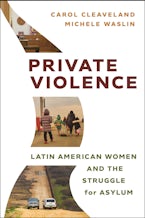How the US asylum process fails to protect against claims of gender-based violence
Through eyewitness accounts of closed-court proceedings and powerful testimony from women who have sought asylum in the United States because of severe assaults and death threats by intimate partners and/or gang members, Private Violence examines how immigration laws and policies shape the lives of Latin American women who seek safety in the United States. Carol Cleaveland and Michele Waslin describe the women’s histories prior to crossing the border, and the legal strategies they use to convince Immigration Judges that rape and other forms of “private violence” should merit asylum – despite laws built on Cold War era assumptions that persecution occurs in the public sphere by state actors.
Private Violence provides much-needed recommendations for incorporating a gender-based lens in the asylum process. The authors demonstrate how policy changes across Presidential administrations have made it difficult for survivors of “private violence” to qualify for asylum. Private Violence paints a damning portrait of America’s broken asylum system. This volume illustrates the difficulties experienced by Latin American women who rely on this broken system for protection in the United States. It also illuminates women’s resilience and the determination of immigration attorneys to reshape asylum law.

